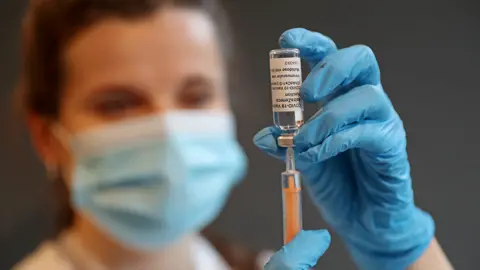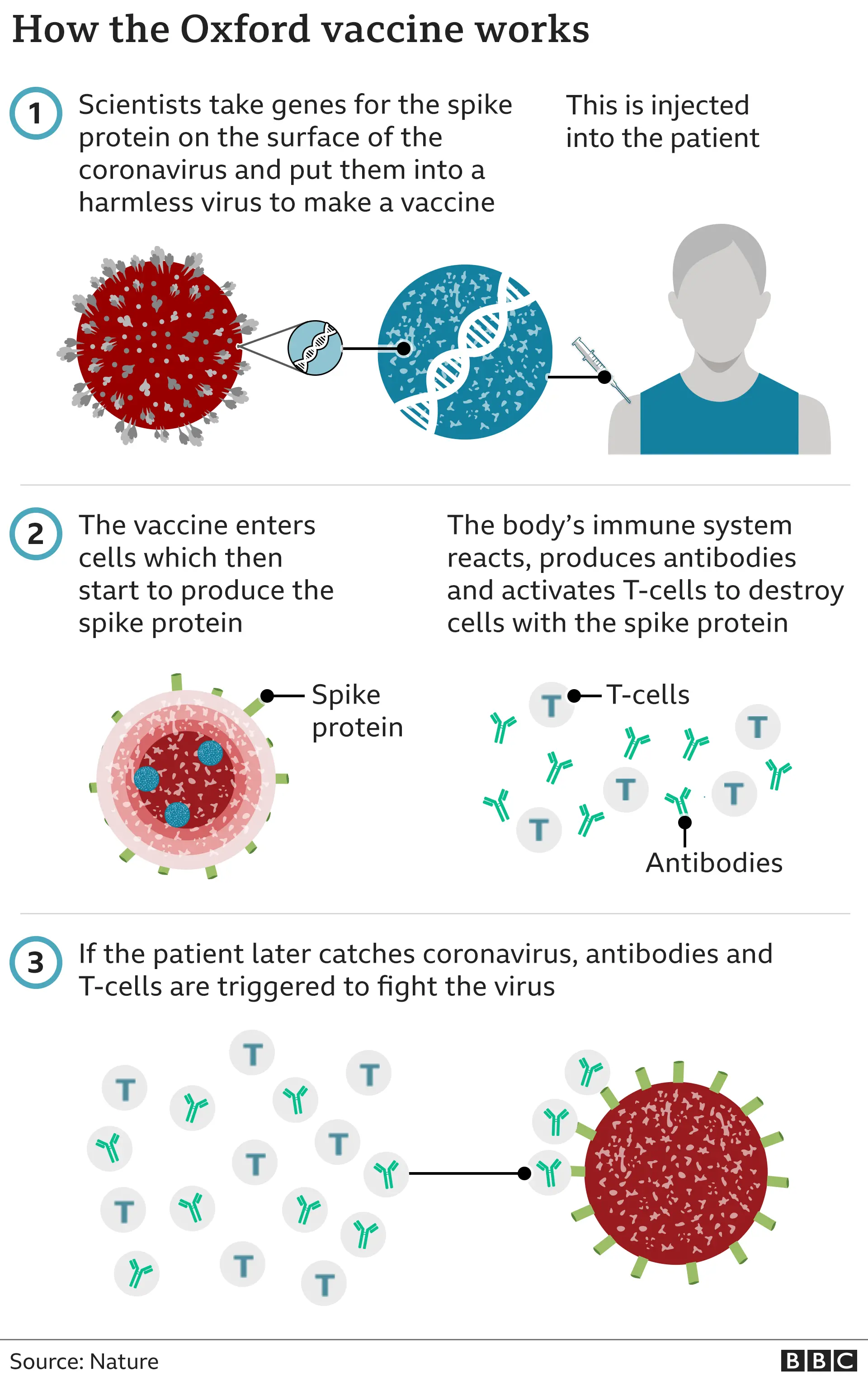Covid: How does the Oxford-AstraZeneca vaccine work?
 Getty Images
Getty ImagesPeople under the age of 40 are to be offered an alternative to the Oxford-AstraZeneca vaccine in the UK as a precaution, after a review of all the latest evidence by vaccine advisers and safety experts.
The UK's medicine regulator - the MHRA - says the benefits of the vaccine still outweigh the risks for the vast majority of people.
What is the latest advice?
The Joint Committee on Vaccination and Immunisation (JCVI) - the body which advises the government - has now recommended that "adults aged 18- 39 years with no underlying health conditions are offered an alternative to the Oxford-AstraZeneca vaccine, if available, and if it does not cause delays in having the vaccine".
Data from the MHRA suggests there's a very small - but slightly higher than normal - incidence of a rare type of clot in younger adult age groups, particularly when the risk of being infected with coronavirus is very low, as it is now.
The risk of a clot is roughly one in 100,000 for people in their 40s, and rises to one in 60,000 for people in their 30s.
Based on the current data, the following is advised:
- Anyone who experiences clotting after a first dose of the vaccine should not receive a second dose
- People with a history of blood disorders (at risk of clotting) should only have the AstraZeneca when the benefits outweigh the risks
- Pregnant women should talk to their GPs about the benefits and risks
What's known about the risk?
The MHRA looked into UK cases of rare blood clots in people who had recently received the Oxford-AstraZeneca vaccine.
It found 242 cases of clotting cases and 49 deaths after an estimated 28.5 million AstraZeneca vaccines doses were administered across the UK up to 28 April.
The MHRA said about four people in a million would normally be expected to develop this particular kind of blood clot - though the fact they are so rare makes the usual rate hard to estimate.
And the regulator said it had not been proven that the jab had caused the clots.
Its head, Dr June Raine, said while the link was "firming up", more evidence would be needed.
The benefits of the AstraZeneca vaccine outweigh the risks of the virus - hospitalisation and death - for the vast majority of people, she said. But for younger age groups it was more "finely balanced".
What are these rare blood clots?
The MHRA study looked at people who had developed clots associated with a low level of platelets after receiving the Oxford-AstraZeneca vaccine.
Platelets are tiny blood cells that help your body form clots to stop bleeding.
Among these clots is a type called a Cerebral Venous Sinus Thrombosis (CSVT).
CVST occurs when a blood clot forms in large veins in the head - stopping blood from draining out of the brain.
As a result, blood cells may break and leak into brain tissue - ultimately leading to a stroke.
The clot can occur naturally and are more common, but still very rare, in younger women.
What symptoms should I watch out for?
The MHRA says anyone who has these symptoms four or more days after receiving the Oxford-AstraZeneca vaccine should seek prompt medical advice:
- A severe or persistent headache
- Blurred vision
- Chest pain
- Shortness of breath
- Swollen legs
- Persistent abdominal pain
- Unusual skin bruising
- Pinpoint spots (not including the injection site)
Covid infection itself can make clots more likely, stresses the MHRA.
What have other countries said about the AstraZeneca vaccine?
The European Medicines Agency (EMA) has said clotting should be listed as a very rare vaccine side effect.
After a study looking at 86 such cases in the EU, the EMA concluded the benefits of the vaccine outweighed the risk and that there was no definite causal link.
Nevertheless, Denmark has stopped its AstraZeneca rollout completely - and Germany, Spain, Italy and Ireland have suspended use of the vaccine in people under 60.
France is recommending it only be given to those aged 55 or over, while Australia says people aged under 50 should get the Pfizer jab instead.
How does the Oxford-AstraZeneca vaccine work?
It is made from a weakened version of a common cold virus (known as an adenovirus) from chimpanzees. It has been modified to contain genetic material shared by the coronavirus - although it can't cause the illness.
Once injected, it teaches the body's immune system how to fight the real virus.

Does the vaccine protect against new variants?
Experts are studying all of the current coronavirus vaccines to check how well they work against new, mutated variants of the virus.
The government's deputy chief medical officer, Jonathan Van Tam, says there is "plenty of evidence" the vaccines appear to be effective against the Kent variant which is dominant in the UK.
There is less evidence about protection against other variants, such as those identified in Brazil and South Africa.
However a study of around 2,000 people suggests, while the Oxford-AstraZeneca vaccine may offer more limited protection against mild and moderate disease caused by the South Africa variant. it should still protect against severe disease.


- VACCINE: How many people in the UK have been vaccinated so far?
- LOOK-UP TOOL: How many cases in your area?
- TEST AND TRACE: How does it work?


